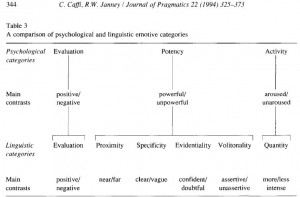Sep 26
ChRIS CLÉiRIGhannouncements, semantics
Schmid, Ulla
Moore’s Paradox
A Critique of Representationalism
Representationalism grasps the meaning and grammar of linguistic expressions in terms of reference; that is, as determined by the respective objects, concepts or states of affairs they are supposed to represent, and by the internal structure of the content they articulate.
As a consequence, the semantic and grammatical properties of linguistic expressions allegedly reflect the constitution of the objects they refer to. Questions concerning the meaning of particular linguistic expressions are supposed to be answerable by investigating the metaphysics of the corresponding phenomena. Accordingly, questions of the meaning of psychological concepts, are turned into questions of the nature of psychological states. Concerned with Moore‘s Paradox, representationalist approaches lead into an investigation of the state of affairs supposedly described by Moore-paradoxical assertions, and thus eventually into investigations concerning the metaphysics of belief.
This book argues that this strategy necessarily yields both a wrong solution to Moore‘s Paradox and an inadequate conception of the meaning of the expression I believe. Turning to the metaphysics of belief is of no use when it comes to understanding either the meaning of the expression ‘I believe’ or the logic of avowals of belief. Instead, it proposes to focus on the role they play in language, the ways in which they are used in practice.
http://www.degruyter.com/view/product/431094
Oct 04
ChRIS CLÉiRIGhgeneral observations, semantics
emotion is to desire
as
perception is to cognition
—∞—
perception is to emotion
as
cognition is to desire
Jul 13
eldonappraisal, pragmatics, semantics
or, why the term ‘commitment’ is already lexically ‘full’ for most linguists who’ve been hit with the psychological stick.
here, below, is a table excerpted from an older article discussing the advances made in the study of affect and emotive v. emotional language at the time: the source is at the top, so no need to reference.[click on the pic for a better image]

the disparate affectations of linguistic labels
it’s notable that for most linguists in the pragmatics tradition (claiming the prague school amongst their antecedents) there has existed a separation between specificity and evidentiality.
the most recent use of the term ‘commitment’ by students of SFL seems more aligned with traditional pragmaticists’ notions of specificity, while for these pragmatic types, ‘commitment’ is a term that is a function of markers of evidentiality, i.e. personal commitment to a position.
while a degree of specificity in language use might also function to signal an individual writer’s degree of commitment to a proposition, my own position on the matter of evidentiality is that it tends to focus attention on the intent of the individual, rather than the social construction of interpersonal relationship (given that both experiential as well as interpersonal meanings are entailed in discourse semantic constructions of such co-positioning) [i feel a sense of irony as i write this].
while many linguists are now taking up the idea that individual psychological ‘processes’ need to be not only factored in but accounted for in any analysis of language – and thus terms which suggest individual psychological focus may be part of a trend – the fact that the use of the term ‘commitment’ seems to straddle two distinctions in traditional discourse analytic approaches may render it immiscible with them.
As is well known, the main linguistic means of commitment in the epistemic modality are Urmson’s (1952) parenthetical verbs, and modal adverbs like ‘probably’, which modify the ‘claim to truth’ of an
assertion. These are called ‘evidentials’ in another tradition. If commitment is defined as a sign of subscription (‘neustic’ in Hare’s terms) (cf. Hare, 1970; Lyons, 1977), then involvement, it seems, could be defined as the emotive subscription to the utterance.
( Caffi&Janney:348)
Jun 26
ChRIS CLÉiRIGhsemantics, suitable quotations
Halliday & Matthiessen (1999: 604)
But in modelling the semantic system we face a choice: namely, how far “above” the grammar we should try to push it. Since the decision has to be made with reference to the grammar, this is equivalent to asking how abstract the theoretical constructs are going to be. We have chosen to locate ourselves at a low point on the scale of abstraction, keeping the semantics and the grammar always within hailing distance. There were various reasons for this. First, we wanted to show the grammar at work in construing experience; since we are proposing this as an alternative to cognitive theories, with an “ideation base” rather than a “knowledge base”, we need to posit categories such that their construal in the lexicogrammar is explicit. Secondly, we wanted to present the grammar as “natural”, not arbitrary; this is an essential aspect of the evolution of language from a primary semiotic such as that of human infants. Thirdly, we wanted to explain the vast expansion of the meaning potential that takes place through grammatical metaphor; this depends on the initial congruence between grammatical and semantic categories.
But in any case, it is not really possible to produce a more abstract model of semantics until the less abstract model has been developed first. One has to be able to renew connection with the grammar.
 RSS
RSS
Recent Comments